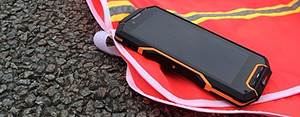The more ready you are for an emergency, the more likely you are to get through it without any serious harm – and it’s best to get going soon before catastrophe strikes. The ideal situation is to be fully prepared, so you can handle it in your footstep when the S really does HTF.
Logically, however, not all of us have the time or money to achieve the readiness point. We ‘re doing everything we can. And if it isn’t as good as it should be, it does help. It also provides you with a framework that you can expand on with some last-minute planning when appropriate.
You’ll have some idea in most cases that stuffs are about to go grim, and a bit of time – perhaps a matter of hours, maybe extending to days of even weeks – to rapidly increase your preparedness level. You can get a surprising amount done in a brief period, so if it’s evident that trouble is on the way, make the most of every minute you’ve got before it hits.
Here are some suggested last-minute tasks:
1. Get all the cash you can
When the power goes out, ATMs won’t work – yet, if there’s a big crisis, they’ll get drained easily anyway because people panic. That’s why you should keep cash in your emergency kits but it won’t hurt to get some more. And if the tragedy is serious enough that cash loses its value, it will take some time for most people to know that – and your dollars may come in handy before they do.
2. Stock up on gas
Fill your tank. Then fill your gas spare containers. When you have the chance, buy more gas cans and fill those too. Gas would be more important in a serious emergency than cash. For other goods, you would be able to remain mobile, run generators and trade the surplus gas.
Related: Types of Fuel for SHTF
3. Find food
Hopefully, you’ve already laid a decent supply of food, but adding a little more won’t hurt-and this could be your last chance. The goal is staples like those you’ve already bought, but it’s worth to have almost everything that’s non-perishable. Food is a valuable trade commodity, even if you don’t eat it yourself.
4. Buy batteries


Identify all the battery sizes your equipment is using, and gather as many as you can. And, in addition to that, snatch every single AA cell that you can get your hands on. You’re likely to end up running through a lot more of these than you would think, plus they’re going to be a handy trade piece.
5. Refresh your water
Although you can still trust the water out the faucet, check your storage. When you have time to clean your tanks, wash them and refill them with fresh water. Make sure to do them one at a time. The last thing you want is for the supply to be cut off suddenly when all your containers have been emptied and washed, and you are just about to begin replenishing them.
Related: Top 20 Places to Hide Your Survival Water Stockpile
6. Collect essential documents
Keeping essential documents together in an easily-grabbed packet is a smart idea. Passports, certificates of birth and marriage, medical information, insurance policies … should always be in a large envelope, ready to pick up and take with you. Check that you have everything, and move them onto your bug-out bag when the disaster emerges.
7. Refill your prescriptions
When you need medicine, get down to the pharmacy and stock it up. That’s especially relevant for prescription drugs-but don’t forget the counter drugs. Do you really want to run low on Tylenol when there is a long-term emergency?
Here are The Only 4 Antibiotics You’ll Need when SHTF
8. Overhaul grab bags
When’s the last time you tested your emergency kit or bug out? Now go through them and find out what’s missing. Anything would be probably; people prefer to steal them, and fail to remove everything they’ve taken out. Solve that while you have time.
9. Fill the freezer
If your freezer has space left, fill some plastic bags with water, seal them and place them in. The less airspace in the fridge, the longer it remains cold, if the electricity goes out. Extend it much more by not opening the door – but that has less impact on a full freezer as less warm air will get in.
10. Explore unusual storage
Is a storm coming? When you are concerned about storm damage and heavy rain, place all of your precious documents, cash and fragile electronics in the dishwasher. It’s one of the most water resistant places in your home. Only ensure it’s unplugged.
11. Secure doors and windows
Whatever type of emergency approaches, you want to make sure that your home is safe from both natural and human hazards. When you’ve got storm windows, fit them. Board up open windows and don’t use any of those in rooms.
12. Prepare for blackouts
No matter how well-trained you are, there is always a possibility that you will have to do without power for a while. Have ready flashlights, equipped with fresh or fully charged batteries. Do you have a fireplace you can cook? Have a ready stock of wood, either indoors or under shelter. Also, make sure you have a non-electric option that can opener.
13. Guard against fire
Most incidents can in some way increase the risk of fire. They also make it crucial to stop fires-the last thing you need is to burn down your house by mistake if society is already crumbling around you. Place extinguishers next to fire hazards. Water or sand buckets, as well as fire cloths, are fine too.
14. Charge your gadgets


Round up any device that has a rechargeable battery, and charge it. Unless you absolutely have to disconnect them, leave them plugged in. That way, if the power goes out, you’ll start as fully charged as you can get it.
Related: 18 Survival Apps That Could Save Your Life
15. Get a car charger
Even if the chances that the power is out, you can still charge anything which has a USB port. If your car has not been damaged by an EMP, it will produce electricity. Most cell phones and other electronics (not all – thanks, Apple) have standardized on Micro USB connectors, so your phone’s car charger will charge a range of other gadgets as well.
16. Set up emergency lighting
Murphy’s Law says it will happen midnight when disaster strikes. That’s not the time to ask yourself where to put the torch. Verify that you have emergency lights dispersed through your home where they can be found and activated easily. Cyalume lightsticks are a good option-they are cheap enough to put a lot of them in. Nonetheless, they don’t offer much illumination, so ready flashlights and battery powered lanterns in your key living spaces.
17. Prepare your tools
Depending on what type of emergency you face, you may want to have some tools ready to handle its aftermath. A storm could damage or even bring down trees, for example. If you have to clear your driveway, or you have fallen a broken tree that threatens to collapse on your home, you will need a chainsaw – and the skill to use it. You don’t want to be learning how to use resources in a situation of disaster; master them when not urgent.
18. Do the laundry
No, that doesn’t seem a priority. Yeah, this is a very good idea. When the electricity is off for a long time you’re going to be content with a supply of clean clothes-and hand washing is a real drag. The longer you can put it off, the better. It doesn’t matter if you don’t get the laundry dry as long as you have it clean before the power goes off.
19. Storm-proof your home
When the extreme weather threatens you, do everything in your power to protect your home in advance. Clean off loose debris outside; it can turn into harmful missiles in high wind. Clear gutters and down pipes which allow rain to flow freely; blocked gutters can cause water damage rapidly. Always search storm drains, and remove any debris.
20. Sort some snacks
You could be pretty busy for some time when the emergency strikes. If you’re both hungry and busy it won’t be much fun, but it could be a while before you get a chance to rest and eat. Arrange some food in advance-stuffs that will last without power. Sandwiches, jerky, or berries help you keep going. A soup thermos will also be a great morale boost through a stormy evening. It seems like a small thing, but sometimes it’s the specifics that make the difference in preparedness.





















